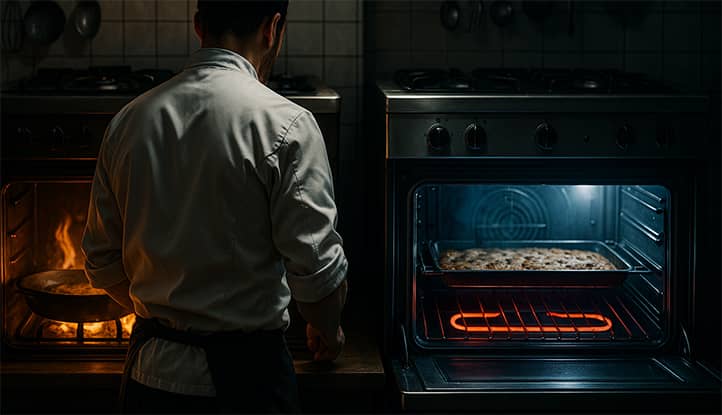Kitchen is not just a place where food is prepared. It is the heart of the home, a space that can reveal much more about your character than it might seem at first glance. The interior, appliances, even the little details in how the space is organized—all of this, seemingly unintentionally, expresses our preferences, habits, and even life values. And if you look closer, even such an apparently purely practical choice as an electric or gas oven can become a real clue to unraveling your psychological profile.
Why the oven specifically? Because it is one of the most frequently used appliances in the kitchen, and our relationship with it can be very telling. Gas ovens, with their flame that you can feel and adjust manually, are often chosen by those who like control but at the same time—improvisation. There’s no automation here, only your experience and intuition. Electric models, with their precision and predictability, tend to attract those who value technology, comfort, and stability. Moreover, your choice can indicate what emotions you experience while cooking: is it a creative process for you, a form of meditation, or just a routine task?
The goal of this article is not just to compare the technical characteristics of the two types of ovens, but to find out what your choice says about you as a person. Are you a creative enthusiast who loves to experiment with fire? Or a methodical perfectionist who chooses the precision of electricity? Or maybe your choice is tied to nostalgia for the tastes of childhood? Today, we’ll figure out how gas and electric ovens influence our culinary habits, emotional state, and even social interaction in the kitchen. And also—whether this choice can reveal your temperament and lifestyle. Get ready to learn something new about yourself—and perhaps look at your kitchen with entirely new eyes.
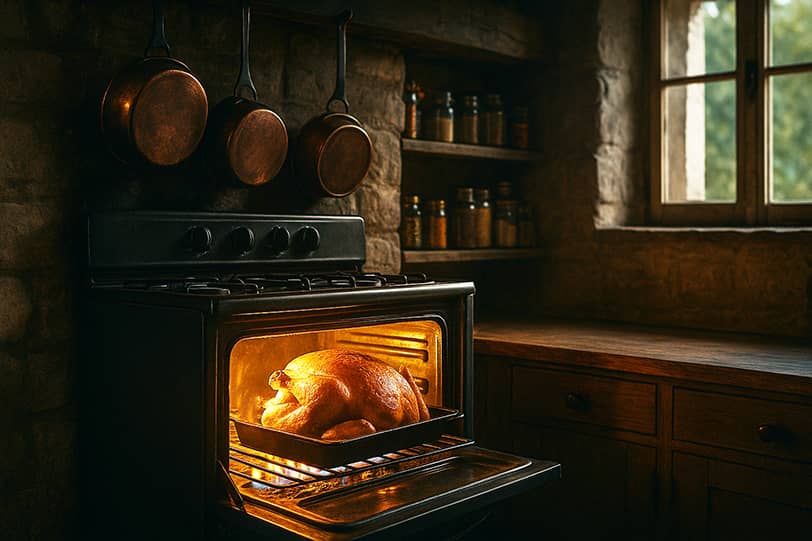
Gas ovens: what kind of people choose them?
The kitchen is always a bit of magic. And somewhere in its heart lies the flame of a gas oven, which attracts some and seems like unnecessary hassle to others. So why do people choose gas? It turns out this choice can reveal a lot about a person’s character, habits, and even memories.
Gas ovens are not just appliances. They represent a particular style of cooking that requires involvement, a sense of control, and even a certain level of skill. There are no buttons or automatic programs here—only you, the flame, and your ability to manage it. And this interaction says a lot about the one who cooks.
Typical traits of “gas” hosts
- Traditionalists. These are people who value classics and time-tested solutions. For them, a gas oven is a symbol of a real kitchen, where everything happens “like at grandma’s.” They love the feeling of being in control: adjusting the flame by eye, determining a dish’s readiness by its smell and appearance. Such hosts are often skeptical of modern technologies, believing that nothing can replace live fire.
- Improvisers. If you love experimenting in the kitchen—you’re likely to choose gas. Here, you can instantly change the temperature, cook something over high heat, or gently simmer when needed. These people often cook “by feel,” without exact recipes, and it’s gas that gives them freedom for creativity.
- Energetic and sharp. Gas requires active participation: you need to ignite it, make sure the flame doesn’t go out, adjust it manually. These little things may irritate some, but for others—it’s part of the pleasure. People who choose gas often prefer a process that keeps them engaged, not just pressing a button and waiting.
- Nostalgia and family values. For many, a gas oven is more than just an appliance. It’s associated with childhood, family dinners, aromas that remain in memory. These people often cook “like mom” or “like grandma” and can’t even imagine a kitchen without that characteristic flame.
Psychological benefits
- Sense of control. Gas allows you to literally “feel” the cooking process. You see the flame, hear it, can change its intensity in a second. This gives a sense that you’re fully in control of the situation—and that’s important for those who like to be the master in their own kitchen.
- Emotional connection to the process. Flame is a “living” element, and many people feel a special bond with it. It resembles the fire in a fireplace—something primal, mesmerizing, and calming at the same time. For many, cooking with gas is not just a process, but a true culinary meditation.
If you choose gas—it may mean you’re someone who values tradition but also loves to improvise. You enjoy being part of the process, not just a spectator. And perhaps somewhere in your memory lives a warm recollection of a kitchen where the smell of borscht filled the air and the dough turned golden in just such an oven.
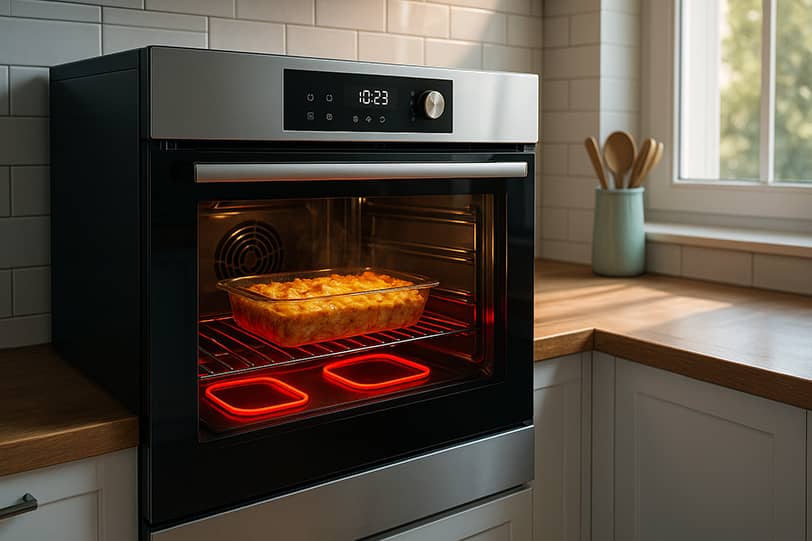
Electric ovens: portrait of their admirers
In the world of kitchen appliances, electric ovens occupy a special place. They have become a symbol of modernity, precision, and safety. If gas ovens represent tradition with their flame and customs, then electric models are a step into the future, where everything is subordinated to technology and comfort.
Choosing electricity often indicates a particular approach to life. These are people who value predictability, cleanliness, and efficiency. For them, the kitchen is not only a place for cooking but also a space where every detail must be thought out to the smallest nuance.
So what makes electric ovens so attractive to a certain type of person? Let’s take a closer look.
Typical traits of “electric” hosts
- Innovators. These are true admirers of technological progress. They are the first to try new features, love precise timers, programmable modes, and the ability to set the temperature to the exact degree. For them, cooking is primarily a science, not an art. These people often choose electric ovens and induction cooktops with touch controls, considering them the pinnacle of kitchen technology.
- Pragmatists. Their main criteria are practicality and convenience. Electric ovens are easier to clean, they provide even heating across the entire surface, and they don’t require constant monitoring. Such hosts like everything to work “automatically” without unnecessary effort. They will choose the model that simplifies their life as much as possible.
- Safety and stability. The absence of an open flame is a key argument for parents of small children or simply for those who value peace and safety. Electric ovens don’t require constant supervision, they have no risk of gas leakage, and they often cool down much faster. It’s the ideal choice for those who want to minimize any hazards in the kitchen.
- Minimalists. The clean, concise design of electric ovens, especially built-in models, appeals to fans of minimalism. They appreciate when appliances don’t stand out but harmoniously blend into the interior. These people often choose ovens without unnecessary details that disrupt the overall harmony of the space.
Psychological benefits
- Predictability. Electric ovens provide a sense of stability. You know for sure that at 180 degrees the dish will cook the same way as it did yesterday. This is perfect for people who love order in everything—from cooking processes to their own daily schedule.
- Less stress. The absence of the need to constantly monitor a flame allows you to relax and focus on other tasks. You can place the dish in the oven, set a timer, and calmly go about your business without worrying that something might go wrong. It’s a real relief for those prone to anxiety.
- Ideal for planners. Precise temperature and time settings allow culinary processes to be planned down to the millimeter. These people often cook according to a strict plan, love to make weekly menus, and calculate the cooking time of each dish in advance. For them, an electric oven is like a reliable assistant that always works according to a clear algorithm.
If you prefer electric ovens, most likely you are someone who values technology, order, and comfort. You love when everything works like a Swiss watch and are willing to invest in appliances that make your life simpler and more predictable. Your kitchen is a reflection of your pragmatic yet refined approach to life.
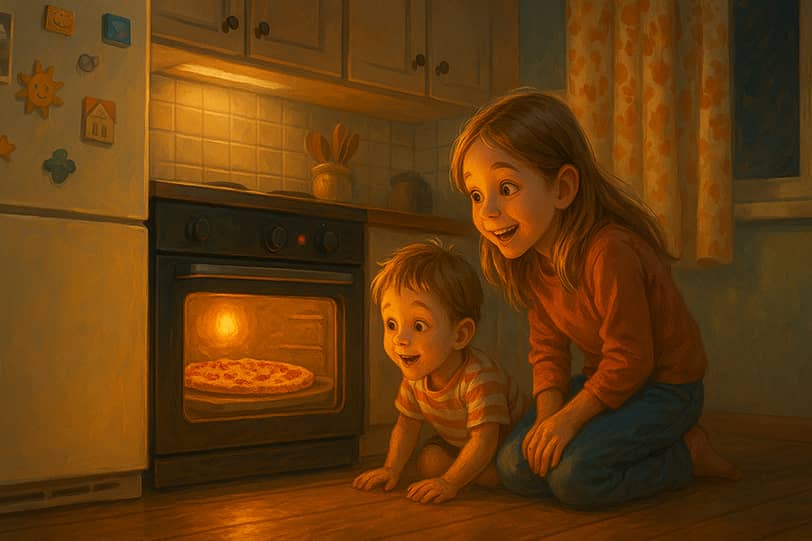
What is more important: practicality or emotions?
An oven is not just a device for cooking. It is a kind of psychological test that reveals our deepest character traits. When choosing between a gas and an electric oven, we often don’t even realize that this choice says more about us than it seems. Are we guided by cold calculation or warm emotions? Do we prefer functionality or atmosphere? Let’s find out how our choice is connected to our personality.
This question resembles the eternal dilemma between reason and feelings. Gas ovens, with their live flame, appeal to our organic, almost primal instincts. Electric models, on the contrary, symbolize progress, control, and technological perfection. So what is actually more important in everyday life—practical advantages or an emotional connection to the cooking process?
Character test
- If you choose gas – you are more spontaneous and emotional. Your choice indicates a creative approach to life. You like to improvise, trust your intuition, and are not afraid of experiments. For you, cooking is not just a process but a way of self-expression. You value the sense of control that comes with adjusting the flame, and that special connection with food that is possible only through direct contact with fire. Your decisions are often guided by feelings rather than cold calculation.
- If you choose electricity – rational and organized. Your choice reflects an analytical mind. You value precision, predictability, and comfort. It is important for you that the cooking process is as convenient as possible and does not require unnecessary effort. You like to plan, calculate time and temperature, and appreciate technologies that allow you to achieve perfect results. Your decisions are usually based on logic and practical considerations.
Impact on culinary habits
- Gas: improvisation. Gas ovens are ideal for cooking “by eye.” They are made for those who love to toss ingredients onto a tray, adjusting the temperature “by feel.” Such hosts more often prepare dishes where an immediate reaction to temperature changes is crucial. Their kitchen is a space of constant movement, energy, and creativity.
- Electricity: baking, slow simmering. Electric ovens are a paradise for lovers of baking and slow cooking. Precise temperature control allows for perfect baking of desserts, cooking meat at low temperatures, and stewing dishes over a long time. Such hosts prefer recipes with exact measurements and cooking times. Their kitchen is a laboratory where every process follows strict rules.
Social aspect
- Gas stoves often bring people together. Live flame acts as a magnet not only for the cook. Gas ovens create a special atmosphere of communication, when everyone gathers around, chatting during the cooking process. This is the traditional center of the family kitchen, where children learn to cook and adults exchange news. Here, cooking becomes a shared activity, not an individual task.
- Electric – for those who value personal space. Electric ovens are more suitable for those who like to cook alone, enjoying their own thoughts. They do not require constant attention, allowing the person to engage in other tasks while cooking. It is the choice of those who value personal space and independence, who love to cook in their own rhythm without being distracted by external factors.
So, what is more important—practicality or emotions? Everyone has their own answer to this question. But it is this very dilemma that makes our choice of oven so personal and revealing. Your oven is not just a device, but a mirror of your personality that reflects your values, habits, and way of thinking.
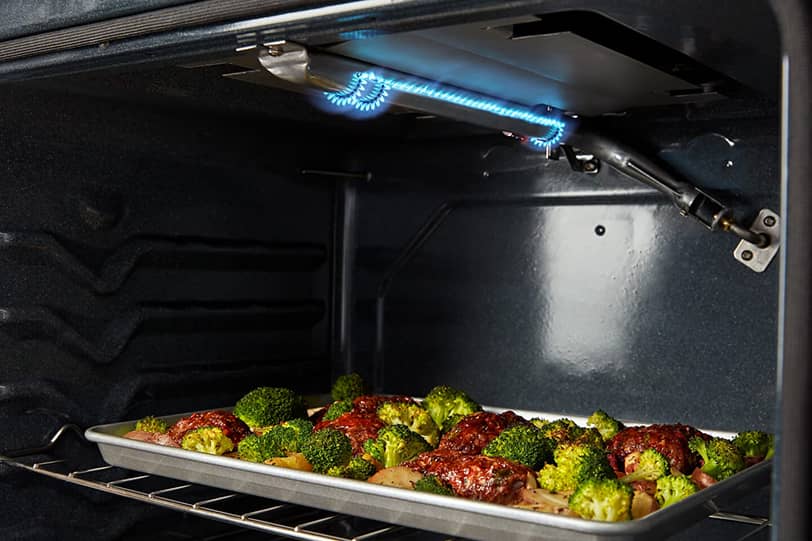
Modern trends: changing preferences and generational differences
The world of kitchen appliances is constantly evolving, reflecting the transformation of our values and lifestyles. In recent years, we’ve clearly seen how different generations approach the choice of ovens in very different ways. If in the past the choice between gas and electricity was mostly a matter of a home’s technical capabilities, today it has become a true marker of generational identity and worldview.
Interestingly, current trends in this area are developing simultaneously in two seemingly opposite directions. On the one hand—technological progress and ecological awareness, on the other—nostalgia for traditions and “hands-on” work. Let’s take a look at how these trends appear in different age groups and what lies behind their choices.
Youth and technology: why does Generation Z choose electricity more often?
Generation Z (born after 1997) is betting on innovation. For them, electric ovens have become the obvious choice for several reasons:
- Speed and efficiency – electricity heats faster than gas, which is perfect for a generation used to instant results.
- Safety – the absence of an open flame makes them ideal for inexperienced cooks.
- Integration with technology – sometimes the ability to control via smartphone, precise timers, and cooking programs match the digital lifestyle of young people.
- Eco-friendliness – high energy efficiency and no emissions align with the eco-consciousness of the younger generation.
Interestingly, for Generation Z, the oven is not so much a source of pride as a functional tool that should simplify the cooking process as much as possible.
Return to tradition: the fashion for “vintage” gas ovens among millennials
Millennials (born 1981–1996) are showing a reverse trend—a return to classic gas ovens, especially in retro style. This is connected with:
- Nostalgia for the childhood kitchen, where food was cooked over a live flame.
- The cult of authenticity – a desire to feel the “real” cooking process, in contrast to sterile technologies.
- Creative self-realization – gas ovens allow a better feel of the process, which is important for a generation that turned cooking into a hobby.
- Aesthetics – retro models with cast iron grates have become a fashionable interior element in the “farmhouse” or “industrial” style.
Interestingly, many millennials who choose gas ovens also actively use modern kitchen gadgets, combining tradition with innovation.
Ecology and psychology: does energy efficiency influence the choice?
Today’s choice of oven is increasingly based on ecological awareness, which gives rise to interesting psychological phenomena:
- Cognitive dissonance among gas supporters – although they value live fire, many feel guilt due to CO₂ emissions.
- Eco-anxiety of young families who choose electricity for the sake of their children’s future.
- Social prestige – in some circles, energy-efficient appliances have become status symbols.
- Compromise solutions – many opt for hybrid models (gas + electricity) to combine the advantages of both technologies.
Interestingly, ecological arguments often persuade even those who initially leaned toward traditional solutions, especially in cities with poor environmental conditions.
Today’s kitchen appliance market clearly demonstrates how social, ecological, and technological changes influence our everyday life. The choice of an oven is no longer just a practical decision—it has become a way of expressing one’s values and belonging to a particular generation.
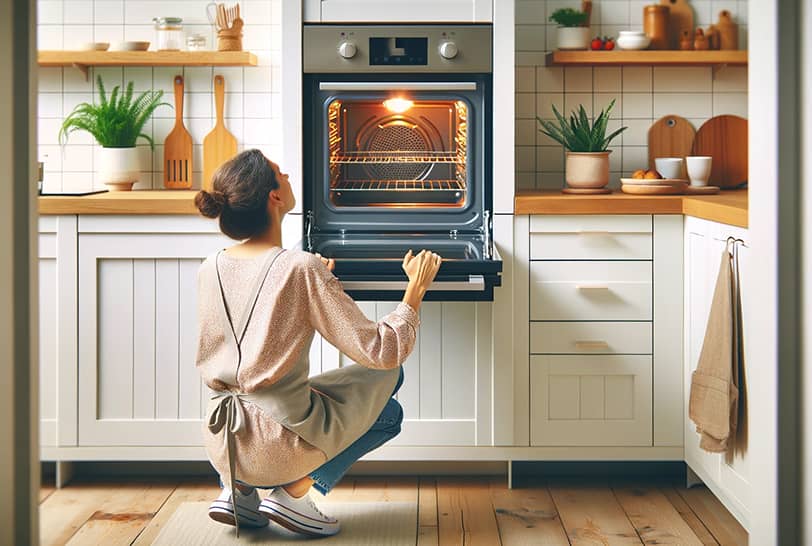
Conclusion
An oven is much more than just a device for cooking. The choice between a gas and an electric oven can reveal an astonishing amount about our character, values, and lifestyle. It is important to understand that there is no single “right” option—both types of ovens have their unique advantages and reflect different, yet equally valuable personality traits.
For some, a gas flame is nostalgia, creativity, and the feeling of live control over the process. For others, the precision of electric models, their predictability and convenience become the embodiment of organization and pragmatism. Both are completely normal, healthy approaches to cooking and life in general. The modern market offers such a wide variety of models that everyone can find the perfect option for themselves.
The main selection criterion is your personal comfort. The kitchen should be a place where you feel confident and cozy, whether it’s a high-tech electric appliance or a classic gas oven. It’s important that the cooking process brings pleasure and suits your temperament.
Interestingly, our choice of oven can change along with us throughout life. Young families often prefer modern electric models, while in mature age, many begin to appreciate traditional gas ovens. Some combine both options—for example, a gas cooktop with an electric oven—thus demonstrating flexibility and the ability to find compromises.
So, before making a choice, it’s worth asking yourself: what is more important to you—creative improvisation or precise calculation? Do you want to feel a live connection with fire or do you prefer automated processes? How do you imagine the ideal cooking process? By answering these questions, you’ll understand which oven truly suits you.
